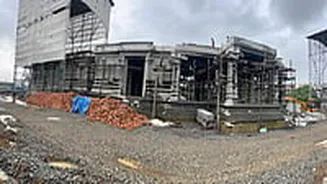Haven-1: The Vision
Vast Space's Haven-1 represents a bold leap into the future of space exploration, scheduled for launch in 2026. This private space station will be a dedicated
platform for a variety of activities, including scientific research, commercial ventures, and potentially even space tourism. The primary goal is to provide a unique and accessible environment beyond Earth, stimulating innovation and allowing for in-depth investigation of space-related phenomena. Haven-1 intends to support various experiments and projects, offering a customizable environment for diverse investigations. Its design will allow it to be adaptable for long-duration research, offering opportunities for studies in areas such as life sciences, materials science, and astrophysics. This initiative reflects the growing trend towards privatization and commercialization in the space industry, with Haven-1 aiming to be a catalyst for further advancements and expansions into space.
Private Space Exploration
The emergence of Haven-1 highlights a transformative era in space exploration, with private companies playing an increasingly prominent role. The involvement of Vast Space signifies the growing significance of commercial entities in pushing the boundaries of space exploration. Unlike previous government-led space programs, the focus here is to create an environment where private research and commercial operations can thrive. This shift allows for increased investment, innovation, and quicker development cycles, opening doors to new possibilities and applications of space-based research. The private sector's agility and market-driven approach can also lead to more efficient and cost-effective solutions. By fostering collaborations and partnerships, companies like Vast Space can also provide opportunities for a diverse range of participants to access space, contributing to both technological advancements and economic growth. This model represents a significant evolution in space exploration, potentially leading to increased accessibility and a broader understanding of the universe.
Scientific Opportunities Aboard
Haven-1 will provide researchers with unparalleled opportunities to conduct experiments in a unique environment. The space station is being designed to host various scientific instruments and facilities, allowing for in-depth studies in areas such as biology, materials science, and fundamental physics. It can facilitate long-term research projects that are not feasible on Earth or in short-duration space missions. Zero-gravity conditions, along with the isolation from Earth's environment, will enable scientists to observe and study phenomena with greater clarity. These investigations will help in advancing our understanding of fundamental scientific concepts. The access to a dedicated space platform will allow researchers to explore new areas and potentially uncover novel discoveries. The data collected from these experiments can contribute to advancements in various fields, improve everyday lives, and offer a more profound insight into our place in the universe.
2026: The Launch
The scheduled launch of Haven-1 in 2026 signifies a culmination of extensive planning, technological development, and financial investments. It represents a significant milestone for Vast Space and also a monumental step for the private space industry. The launch phase will involve integrating complex spacecraft systems, launching the station into orbit, and ensuring its proper functioning. A successful launch is essential for realizing the vision of Haven-1. Post-launch, the station will begin its mission of hosting scientific experiments, supporting commercial activities, and fostering international collaboration. This initial launch will pave the way for future expansions and upgrades, possibly including additional modules and capabilities. The year 2026 will not only mark the beginning of a new era of space exploration, but also the beginning of continuous innovation and discoveries.
















